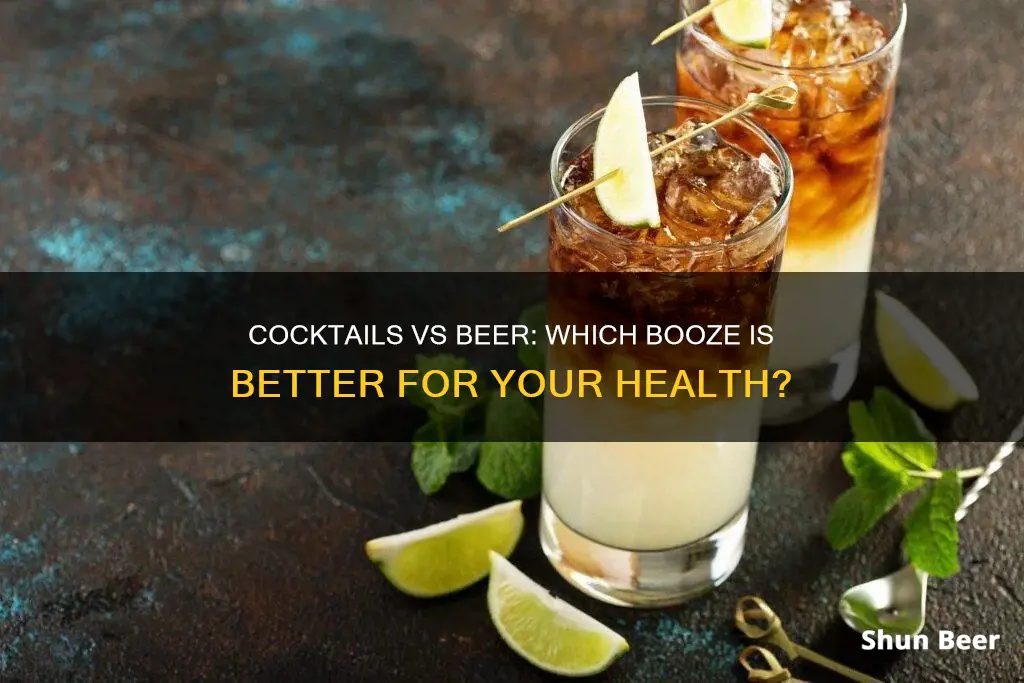
Alcohol is a toxic and addictive substance with no safe amount that does not affect health, according to the World Health Organization (WHO). However, some alcoholic drinks are less harmful than others. Beer, for example, has more antioxidants than hard liquor, but liquor often has fewer or no carbohydrates. Beer is also high in calories and carbohydrates, which can lead to weight gain. On the other hand, cocktails, depending on their ingredients, can be packed with calories and sugar content. Clear liquors like vodka, gin, and tequila are the lowest in sugar and calories and are the easiest for our bodies to metabolize.
| Characteristics | Values |
|---|---|
| Calories | Beer has more calories than cocktails, but this depends on the number of cocktails consumed and the ingredients used. |
| Carbohydrates | Beer contains more carbohydrates than spirits, but cocktails with sugary mixers can have more carbs than beer. |
| Antioxidants | Beer contains phenolic compounds and antioxidants, which cocktails may lack depending on their ingredients. |
| Alcohol Content | Cocktails, or hard liquor, have a higher alcohol content (ABV) than beer. |
| Taste | Cocktails can be made with non-alcoholic mixers to improve their taste, making them easier to drink. |
| Health Risks | Excessive consumption of either beer or cocktails can lead to health issues, including liver damage and an increased risk of certain cancers. |
What You'll Learn

Beer has more antioxidants than spirits
Beer contains phenolic compounds or antioxidants. In beer, the antioxidants originate mostly from barley malt, with the rest contributed by hops. Antioxidants are important compounds that help us stay healthy, attenuating the oxidative stress that arises from the overproduction of reactive oxygen or nitrogen species. Antioxidants can act in different ways: they can scavenge free radicals, inhibit pro-oxidative enzymes, and chelate metal ions, among other functions.
The main antioxidant compounds in beer are phenolic compounds and melanoidins (formed throughout the Maillard reaction). In addition, some antioxidant additives used in beer (e.g., vitamin C) may also contribute to its antioxidant capacity. The content of phenolic compounds and melanoidins in beer is greatly influenced by the genetic factor of its raw materials and, therefore, the environmental conditions in which they grow. It is also influenced by technological brewing factors.
Beer antioxidants mainly come from two ingredients used in brewing: malt and hops. The antioxidant capacity of beer, therefore, depends on the antioxidant contents in these two ingredients and on different parameters involved in brewing, namely the variety of barley, the malting process, temperature, and pH during mashing, sparging, boiling, the variety of hops used, and yeast fermentation.
Around 70-80% of the phenolic compounds present in beer are derived from malt, while the remaining 20-30% come from hops. Moreover, malt can contribute to around 95% and 86% of the antioxidant capacity of dark and pale beers, respectively. Hopping did not significantly affect the antioxidant activity of beer.
In summary, beer has more antioxidants than spirits. The antioxidants in beer come from the malt and hops used in brewing and provide health benefits such as attenuating oxidative stress and reducing the risk of cardiovascular disease.
Bitter Beers: Health Benefits or Just a Fad?
You may want to see also

Spirits have fewer or no carbohydrates
Spirits, such as rum, vodka, whiskey, gin, and tequila, have no carbohydrates after the distillation process. This means that a shot of any of these spirits is completely carb-free. Of course, if you mix your spirits with a sugary mixer, like juice or soda, you'll be adding carbohydrates and calories to your drink. For example, tonic water contains 32 grams of carbohydrates per 12-ounce can. So, if you're looking to keep your carbohydrate intake low, it's best to stick to spirits on their own or mixed with a carb-free mixer, like soda water.
If you're watching your carbohydrate intake, beer is not the best choice. Most beers are loaded with carbohydrates, and even light beers will typically have around 3 grams of carbohydrates per serving. That being said, if you're looking to treat yourself, there are some low-carb beer options available, such as Michelob ULTRA, which has 2.6 grams of carbohydrates per serving.
So, if you're trying to decide between a cocktail and a beer, and carbohydrate content is a factor in your decision, a spirit-based cocktail is likely to be the lower-carb option. Just be mindful of your mixers!
Beer's Health Benefits: Friend or Foe?
You may want to see also

Spirits are more dangerous than beer due to higher alcohol content
While beer and spirits have their pros and cons when it comes to health, spirits are more dangerous than beer due to their higher alcohol content. Spirits have a higher alcohol content than beer, and consuming them can result in drinking more alcohol in a shorter amount of time. For instance, it takes much less vodka, rum, or whiskey to get drunk than beer or wine. It would take minutes, or even seconds, to drink a couple of shots of vodka (60ml), but it would take much longer to drink the equivalent amount of alcohol in beer (570ml).
Young people, in particular, are more likely to consume spirits because a smaller amount is needed to achieve the desired effect. However, this is where the danger lies. By the time they feel the negative effects of alcohol, they have already consumed too much and can find themselves in dangerous situations, such as alcohol poisoning, which can lead to a trip to the emergency department.
It is important to note that alcohol is not a healthy choice in general, and excessive alcohol consumption is associated with various health risks, including liver damage and an increased risk of certain cancers. Therefore, moderation is key when it comes to alcohol consumption, regardless of the type of beverage.
Vodka vs Beer: Which Alcoholic Drink is Healthier?
You may want to see also

Alcohol is linked to a lower risk of heart disease but a higher risk of cancer
Alcohol consumption is linked to a number of health outcomes, both positive and negative. While moderate alcohol consumption may be linked to a lower risk of heart disease, excessive alcohol intake is associated with an increased risk of heart conditions, including high blood pressure, heart failure, and stroke.
In terms of cancer risk, alcohol consumption, especially heavy drinking, is associated with an increased risk of developing several types of cancer. The evidence suggests that the more alcohol a person consumes, particularly over a long period, the higher their risk of an alcohol-associated cancer. Even moderate drinkers have an elevated risk of certain cancers compared to non-drinkers. The types of cancer linked to alcohol consumption include head and neck cancer, esophageal cancer, liver cancer, breast cancer, and colorectal cancer.
The mechanisms by which alcohol consumption may increase cancer risk involve the metabolism of ethanol, which can lead to the formation of toxic chemicals and damage to DNA and proteins. Alcohol can also impair the absorption of nutrients that protect against cancer, such as vitamins and folate, and increase blood levels of certain hormones, such as estrogen, which is linked to breast cancer risk.
While moderate alcohol consumption may have some potential health benefits, it is important to weigh these against the serious negative health effects associated with excessive alcohol intake. According to health guidelines, individuals who do not drink alcohol should not start drinking, and those who choose to drink should do so in moderation.
Beer's Heart Health Benefits: Fact or Fiction?
You may want to see also

Drinking in moderation is key to any health benefits
While alcohol is never going to be considered a health food, drinking in moderation can have some health benefits. It's important to note that the definition of moderate drinking varies, but it generally means no more than one drink per day for women and no more than two drinks per day for men.
Drinking in moderation has been linked to a reduced risk of heart disease, with research showing that moderate drinkers are 25% to 40% less likely to have a heart attack or stroke. This may be because small amounts of alcohol can raise HDL levels, also known as "good" cholesterol. Additionally, moderate drinking may also reduce the risk of type 2 diabetes and gallstones.
However, it's important to weigh the risks and benefits of alcohol consumption. Heavy drinking can cause liver damage, increase the risk of certain cancers, and contribute to depression and violence. It's also important to consider individual factors, such as family history, medication use, and overall health, when deciding whether to consume alcohol.
When it comes to cocktails or beer, both can be consumed in moderation as part of a healthy lifestyle. Beer contains more antioxidants than hard liquor, but liquor often has fewer or no carbohydrates. However, when mixed with sugary ingredients, the calorie count of cocktails can increase significantly. Therefore, drinking in moderation is key to reaping any potential health benefits from alcohol consumption.
Beer and Kidney Health: Exploring the Connection
You may want to see also
Frequently asked questions
No alcohol is "healthy", but some drinks are less harmful than others. Cocktails are usually made with spirits, which have a higher alcohol content than beer, so they can be more dangerous. However, beer is high in calories and carbohydrates, which can lead to weight gain.
Cocktails made with clear liquors like vodka, gin, or tequila are the healthiest options. These liquors are lower in sugar and calories and are easier for the body to metabolise.
Cocktails made with dark liquors like bourbon contain impurities called congeners, which can lead to a worse hangover.
Avoid using sugary mixers like juice, which will add extra calories and increase the risk of a hangover. Instead, use low-calorie or no-calorie mixers like soda water or diet soda.







